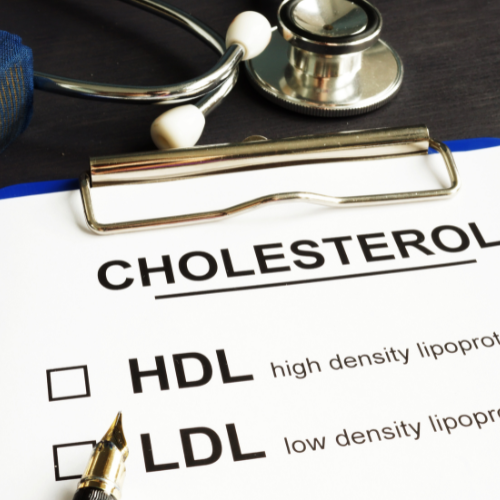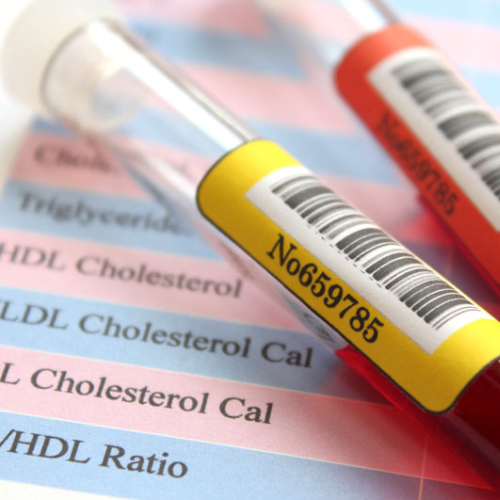Cholesterol is perhaps one of the most controversial topics in the field of nutrition. There is so much confusion out there that it’s no wonder that many people don’t know what to think about their cholesterol numbers or how they’re influenced by the foods they consume!
However, as we’ve previously written, dietary cholesterol has little effect on your blood cholesterol.
It more boils down to the amount of saturated and trans fat in your diet, as well as genetics and other environmental factors.
So how exactly can you go about reducing your LDL cholesterol levels?
Cholesterol Guidelines
Well, first, you need to know what levels you should be aiming for.
According to the 2018 guidelines published in the journal Circulation, these are the optimal HDL, LDL, triglycerides, and total cholesterol levels for adults:
- Total Cholesterol: Less than 200. Unfortunately, nearly 107 million Americans have cholesterol levels that are greater than 200mg/dL, which is perilously close to the average cholesterol level of coronary artery disease victims!
- HDL Cholesterol: 60 or higher is optimal (below 40 is considered to present an increased risk for heart disease)
- LDL Cholesterol: Below 100 (and below 70 if you have coronary artery disease)
- Triglycerides: Below 150 has been shown to lower risk for heart disease (and ideally below 100 for fasting levels)
The ideal recommendations are a fasting measurement, which is the most accurate as food and drink can affect your levels.
How Can You Lower Your LDL Cholesterol?
You firstly need to significantly reduce your intake of trans fat (which comes from processed foods such as potato chips, margarine, canola oil and certain vegetable oils, and naturally from meat and dairy), and saturated fat (found primarily in animal products and junk foods).
We can learn a few things from people living in rural China and Africa where there are extraordinarily low rates of heart disease. Although Chinese and African diets are very different, they are both centered on plant-based foods such as grains and vegetables. Due to the high-fiber content and lack of animal fat, their total cholesterol levels averaged under 150 mg/dL. This is similar to people eating strictly plant-based diets in the Western world. 
In 2017, researchers reviewed 49 studies that compared plant-based diets with omnivorous diets to test their effects on cholesterol. Plant-based diets showed lowered total cholesterol, LDL cholesterol and HDL cholesterol levels when compared to omnivorous diets. In fact, low-fat, plant-based diets typically reduce LDL levels by about 15-30%.
A plant-based diet focused on plenty of fruits and vegetables, whole grains instead of refined ones and legumes is going to provide you with a high fiber intake which is your best safeguard against cholesterol. Soluble fiber slows the absorption of cholesterol and reduces the amount of cholesterol the liver produces. It also removes cholesterol by way of excretion through your colon.
The Best Foods to Lower Your Blood Cholesterol Levels
To lower your LDL cholesterol or prevent high cholesterol in the first place, include plenty of the following foods in your diet:
1. Legumes
Legumes are high in soluble fiber, which we've already seen is one of the best things you can consume to lower your cholesterol levels. They are also high in protein, making them very filling so you tend to eat less of other things that may contain saturated fats that hike up cholesterol. They also contain plenty of potassium, magnesium, folate, and other nutrients that are associated with overall improved cardiovascular health.
A 2014 review of 26 randomized controlled trials found that eating just half a cup of legumes per day compared to not eating any legumes, can lower LDL cholesterol by an average of 6.6 mg/dl.
In another meta-analysis that looked at data from ten randomized controlled trials involving 268 participants who consumed legumes in amounts ranging from ½ a cup to 2 cups, the researchers found that the legume diets resulted in an average 8-point decrease in LDL cholesterol.
All of these improvements are impressive! We’re talking about beans, not medicines with all those side effects!
2. Whole grains
Whole grains such as whole wheat, barley, oats, quinoa, bulgur, and brown rice, are also high in soluble fiber. Eating whole grains instead of refined grains significantly lowers total cholesterol, LDL cholesterol, triglycerides, as well as insulin levels. In particular, oats and barley are good sources of beta-glucan, a type of soluble fiber, which is quite effective in lowering cholesterol.
In a meta-analysis of 7 major studies, those who ate 2.5 or more servings of whole grains per day were 21% less likely to suffer from cardiovascular disease (heart attack, stroke, or the need for a procedure to bypass or open a clogged artery) than those who ate less than 2 servings per week. 
3. Nuts and seeds
Another nutrient that is known to help lower cholesterol levels are monounsaturated fats which nuts and seeds are loaded with. Nuts and seeds, especially almonds, are also rich in arginine, an amino acid required for the production of nitric oxide that relaxes constricted blood vessels and eases blood flow. They also contain fiber, vitamin E, folate, potassium, and other heart-healthy nutrients.
Nuts and seeds, especially sesame seeds, pistachios, pumpkin seeds, and sunflower seeds, are also high in phytosterols, compounds that resemble cholesterol and block its absorption in your intestines. In fact, these nuts and seeds contain about four times as much as one avocado which is the highest fruit source of phytosterols. One study saw a significant drop in both total and LDL cholesterol in a group of people with high cholesterol after the group added 1.5 to 3 ounces of pistachios to their low-cholesterol diet.
In one of the largest studies on nuts and health that followed 210,000 health professionals over a duration of 32 years, researchers found that, compared with those who never or rarely ate nuts, people who ate one ounce of nuts five or more times per week, had a 14% lower risk of cardiovascular disease and a 20% lower risk of coronary heart disease.
4. Dark leafy greens
Here’s another reason to load up on the amount of dark, leafy greens on your plate! Dark leafy greens such as kale, spinach and broccoli, are high in carotenoids such as lutein which act like antioxidants in your arteries, protecting them from plaque build-up. One animal study showed that a diet high in lutein prevents the accumulation of cholesterol and decreases oxidised LDL and inflammation.
Another way that dark leafy greens may be able to reduce cholesterol is due to their ability to bind to bile acids, causing your body to excrete excess cholesterol. Steaming your green leafy veggies enhance this effect.
5. Garlic and onions
In one meta-analysis, researchers found that consuming ½ to 1 whole clove of garlic per day lowers cholesterol levels by approximately 10%. A 2016 review showed that garlic may reduce total cholesterol by up to 30 milligrams per deciliter (dL).
Onions contain quercetin, a compound that has been shown in animal studies to lower cholesterol. They may also play a role in preventing inflammation and the hardening of arteries, which may be beneficial to people with high cholesterol. Onion peels, especially, are high in compounds that are beneficial for your heart.
6. Fruit
Certain fruits such as berries, apples, citrus, and grapes- contain a specific type of soluble fiber called pectin. Studies have shown pectin has the ability to reduce cholesterol levels by up to 10%.
However, the research says that the effects are dependent on the type of pectin. For example, pectin from both apple pomace and citrus were shown to reduce LDL cholesterol by between 7 and 10% when consumed at a level of 15 grams per day for four weeks, but these results were only seen for pectin with a particular chemical structure.
These fruits, especially berries and citrus, are also a great source of antioxidants that are great for your heart health. 
7. Avocados
Avocados are the richest fruit source of phytosterols, which are the cholesterol-lowering nutrients found in plants. However, they also contain other compounds including monounsaturated fatty acids which may also account for their cholesterol-lowering effects.
One study showed that the inclusion of one avocado per day as part of a moderate-fat, cholesterol-lowering diet enhances LDL cholesterol-lowering effects, especially for small, dense LDL.
Also, a 2016 meta-analysis of 10 studies found that replacing other dietary fats with avocados was linked to lower levels of total cholesterol, LDL cholesterol, and triglycerides.
8. Soy
Another way to lower LDL cholesterol is to eat more soy protein. According to a 2019 review published in The Journal of Nutrition that involved 43 trials, the researchers found that, on average, eating 25 grams of soy protein per day, over a six-week period, lowered LDL levels by about 3-4%. This is not a large amount, but it is still significant.
On The Road to Lowering Your Cholesterol
Unfortunately, a high cholesterol level increases one’s risk of developing several chronic diseases. It is, therefore, best to nip this in the bud and do what you can to lower it.
While it does entail giving up quite a number of foods that you may have grown accustomed to eating over the years, the rewards will greatly outweigh the cost. Incorporating these 8 foods in your meals will not only help reduce your cholesterol, but also lead you down the road of having a more balanced diet. Take it one step at a time and celebrate your small wins.
Recipe Spotlight: Chickpea Buddha Bowl
Contrary to popular belief, lowering your cholesterol doesn’t mean you can’t have fun, tasty meals anymore! With a dash of creativity and a little bit of help from us, you can enjoy the foods that you can eat while you’re on this journey.
Our Chickpea Buddha Bowl recipe contains legumes, dark and leafy vegetables, garlic, plus a colorful mix of sweet potatoes, turmeric, oregano, and kimchi—ingredients that are proven to help reduce one’s LDL cholesterol. Try it out and let me know how it goes!














What Do You Think? Comment Below: